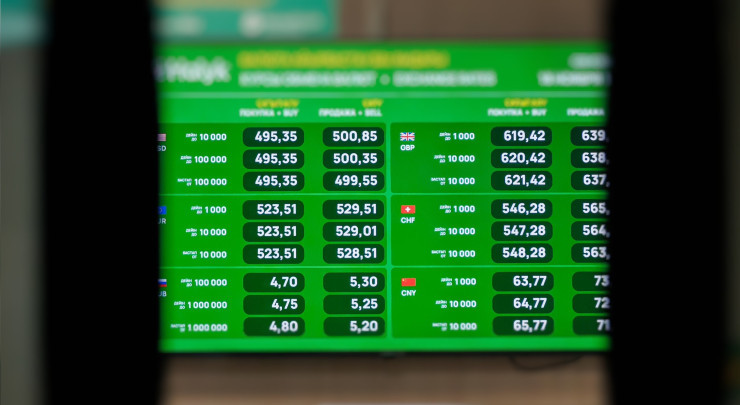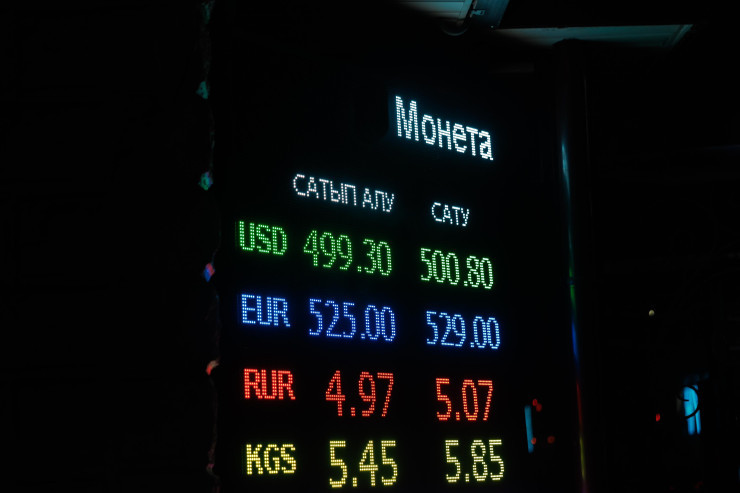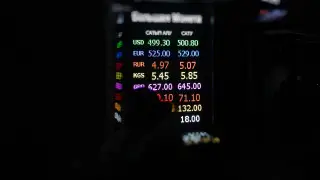Tengrinews.kz – The dollar exchange rate reached 500 tenge for the first time in Kazakhstan. Kazakh economists explained the reasons for the weakening of the national currency and the role of the National Bank in the current situation.
Why is the tenge weakening?
According to financial analyst Arman Beisembaev, the weakening of the tenge is a long-term trend related to the peculiarities of the Kazakh economy.
"Sooner or later, the tenge will return to its trend of permanent depreciation in any case. There are no fundamental grounds for breaking this trend. A weak national currency, on the contrary, is beneficial for a raw materials economy. The weaker the exchange rate, the more tenge we get for one dollar, which is good for the budget," the economist noted during an interview with a correspondent.
He explained that in the conditions of an export-oriented economy, a weak currency allows products to be made cheaper on international markets, which improves their competitiveness. However, for the population, this means rising prices due to the rise in the cost of imported goods.
Economist Aidar Alibaev believes that the weakening of the national currency is directly related to the behavior of the ruble, which began to weaken several days ago.
"Since our country has no domestic production, no added value, so our currency has nothing to fill, the tenge always depends on the dollar, euro, oil, Russian ruble. Look at the end of the year, we are approaching the figure of 5.6 trillion, which we take from the National Fund. Plus, we borrow from whoever we can, we take money from the Unified Accumulative Pension Fund (UAPF)," the Kazakh economist believes.
Can the National Bank intervene?
Arman Beisembaev, continuing the conversation, noted the key role of the National Bank of Kazakhstan in maintaining the stability of the exchange rate and preventing its sharp depreciation.
"We see that every time the rate approached the 496 tenge mark, the National Bank reacted. Interventions were carried out in early October and last week. The National Bank clearly hinted that it is ready to act tough and conduct a real intervention, if necessary. This indicates that a sharp and uncontrolled depreciation of the tenge is not beneficial to either the National Bank or the government. Therefore, if the situation starts to get out of control, the National Bank will most likely intervene," Beisembayev emphasized.
However, according to him, the current achievement of the 500 tenge mark may indicate that the National Bank has either allowed the rate to form on its own or is temporarily refraining from intervening.
"If the National Bank decides to intervene, we may see a sharp strengthening of the tenge rate in the next 2-3 days. But the probability of this is always 50/50. They may allow the rate to weaken further," he added.
Economist Aidar Alibaev also expressed confidence that the National Bank will not allow the situation to get out of control.
"Earlier, the National Bank claimed that the tenge is floating freely, in a market economy, and no one influences it. You know, in reality, this has almost never happened. The bank always interferes in the policy of forming the tenge exchange rate: it has interfered before and will interfere now," Alibaev noted.
 Photo: Tengrinews.kz/Alikhan Sariyev
Photo: Tengrinews.kz/Alikhan Sariyev
What Kazakhstanis should expect
Arman Beisembaev emphasized that the dollar exchange rate above 500 tenge is not a "catastrophe" for the economy, but rather reflects its current structure. Nevertheless, this will increase inflation through the rise in the cost of imported goods.
"Will prices rise? Yes, they will. This is due to the currency component, when the weakening of the exchange rate makes imported goods more expensive. However, the budget benefits from this due to the increase in revenues. This allows for indexing pensions, benefits and salaries," he explained.
According to the economist, long-term strengthening of the tenge is unlikely. The Kazakh economy, based on the export of raw materials, needs a weak currency to be competitive in international markets. However, it is important that the weakening of the exchange rate occurs gradually, without sharp jumps.
Forecasts and possible actions
The market's attention is currently focused on the actions of the National Bank. Expert Beisembaev suggests that the coming days may show whether interventions will be undertaken to strengthen the tenge exchange rate.
"The dollar is 500, but will it be more? ‘Why?’ is a meaningless question, because we do not know. Again, we proceed from the logic that the weaker the rate, the better. But the most important thing is to prevent a sharp weakening. If the National Bank decides to intervene, we will see a sharp strengthening of the tenge. However, if it chooses a wait-and-see attitude, the rate may continue to weaken," the economist concluded.
The situation on the currency market remains uncertain. Economists advise closely monitoring the actions of the regulator and adapting to the current economic reality.
How Kazakhstanis react and what is happening in exchange offices
 Photo: Tengrinews.kz/Alikhan Sariyev
Photo: Tengrinews.kz/Alikhan Sariyev
The Association of Exchange Offices of Kazakhstan commented on how Kazakhstanis reacted to the change in the national currency rate.
"With sharp jumps in the rate, we do not see panic and excitement, as it was before. The population prefers to wait out the ‘storm’, and then take some action. Although I would not call a four percent increase a ‘storm’. That is why we do not see queues or panic near exchange offices now," Archin Galimbaev, president of the Association of Exchange Offices, explained to the correspondent.
Recall that the dollar exchange rate in Kazakhstan's exchange offices continues to grow. In a number of cities, the sale of the American currency already exceeds the 500 tenge mark.
Read also: Trump's victory affected the tenge - National Bank

